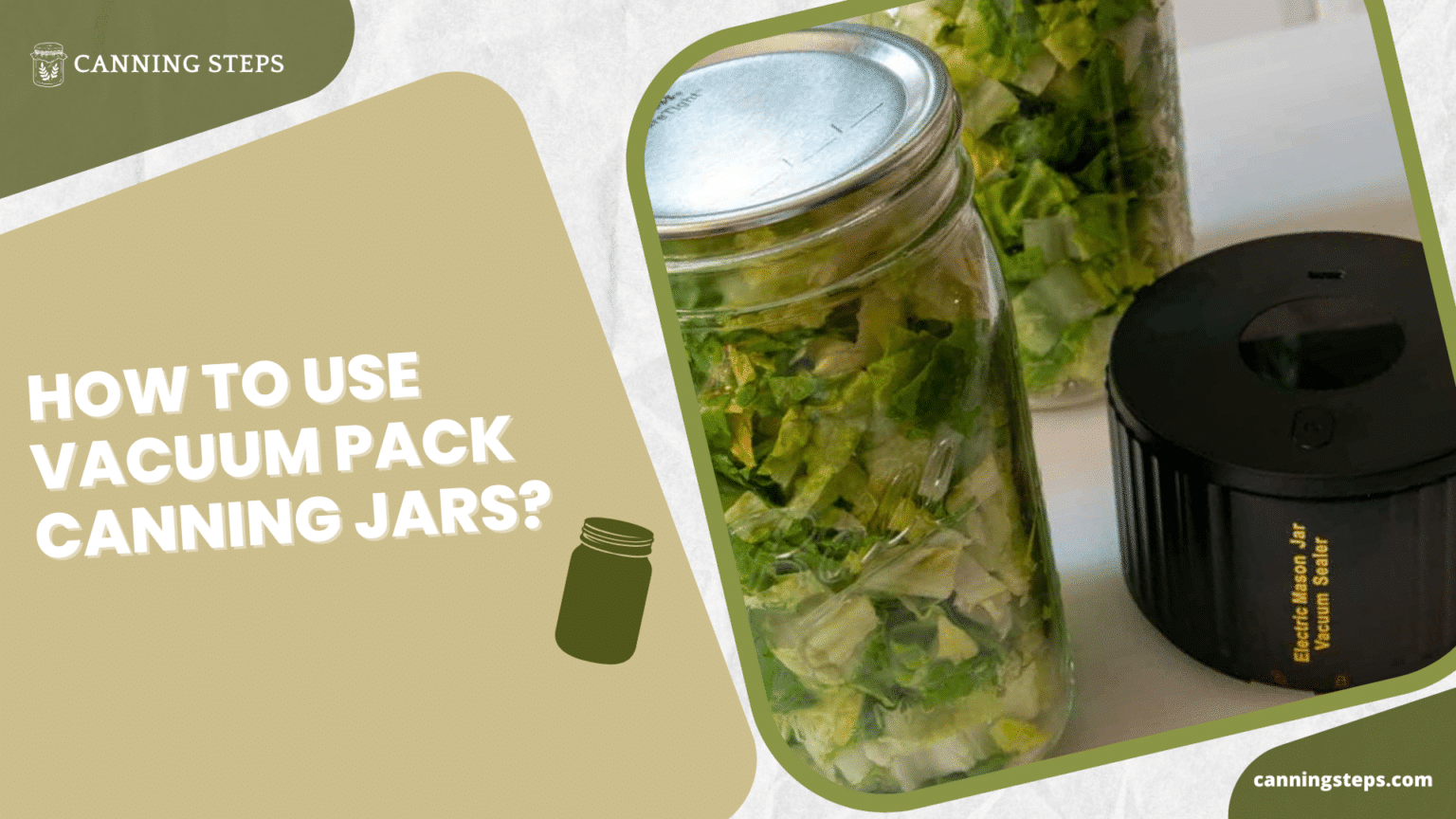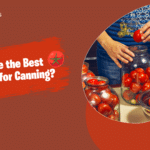Is all your food spoiling away? Are you also in a big dilemma of keeping your edible goods fresh and preserved for a longer period of time? Here’s the answer to your long-awaited quest. You can use vacuum-pack canning jars to store and keep your food fresh at all times. Vacuum-packed canning jars are a novel way to embrace freshness and bid farewell to stale, dry products. Make those empty jars into pantry protectors by using them to keep rice, pasta, and other items fresher for longer. You can discover the potential of preservation as we walk you through the process of vacuum-sealing spaghetti and Mason jars. These glass marvels are the pinnacle of environmentally friendly storage solutions and maintain your dry items in excellent condition. Let us see how we can vacuum-pack empty jars.
How to Vacuum Pack Empty Canning Jars?
Bid farewell to disarray in your kitchen and welcome the eco-friendly allure of transforming empty jars into well-organized spaces for your dry products. Jars become overlooked in a farmhouse where recycling is rare and curbside waste service is a far-off dream. Every glass container, whether it’s a Mason jar or a recycled salsa, mayonnaise, or spaghetti sauce jar, has a use, transforming your kitchen into a useful sanctuary. Pasta, rice, and other dry commodities are elegantly housed in half-gallon and smaller jars, while gallon-sized jars tower like canisters, holding flour and sugars. The journey doesn’t end there. Instead of being thrown out, those jars that formerly held leftover salsa and pasta sauce are now guardians of dehydrated goodies like chopped peppers, onions, sliced mushrooms, and necessities like pasta, rice, and flour.
Upgrade your canning skills with the Jar Sealer Kit.
- This attachment, an essential component of the 2-in-1 Vacuum Sealing Kit, makes storage more accessible for jam, flour, sugar, and pasta.
- Bid farewell to traditional techniques as you discover the expert techniques for vacuum-sealing Mason jars.
- The jar sealer, which prioritizes efficiency and simplicity, increases shelf life and turns your kitchen storage into a well-organized sanctuary.
- With this indispensable tool, you can unleash the magic of freshness and easily preserve your culinary ingredients.
- This one is a thousand times better solution than the regular mouth jars.
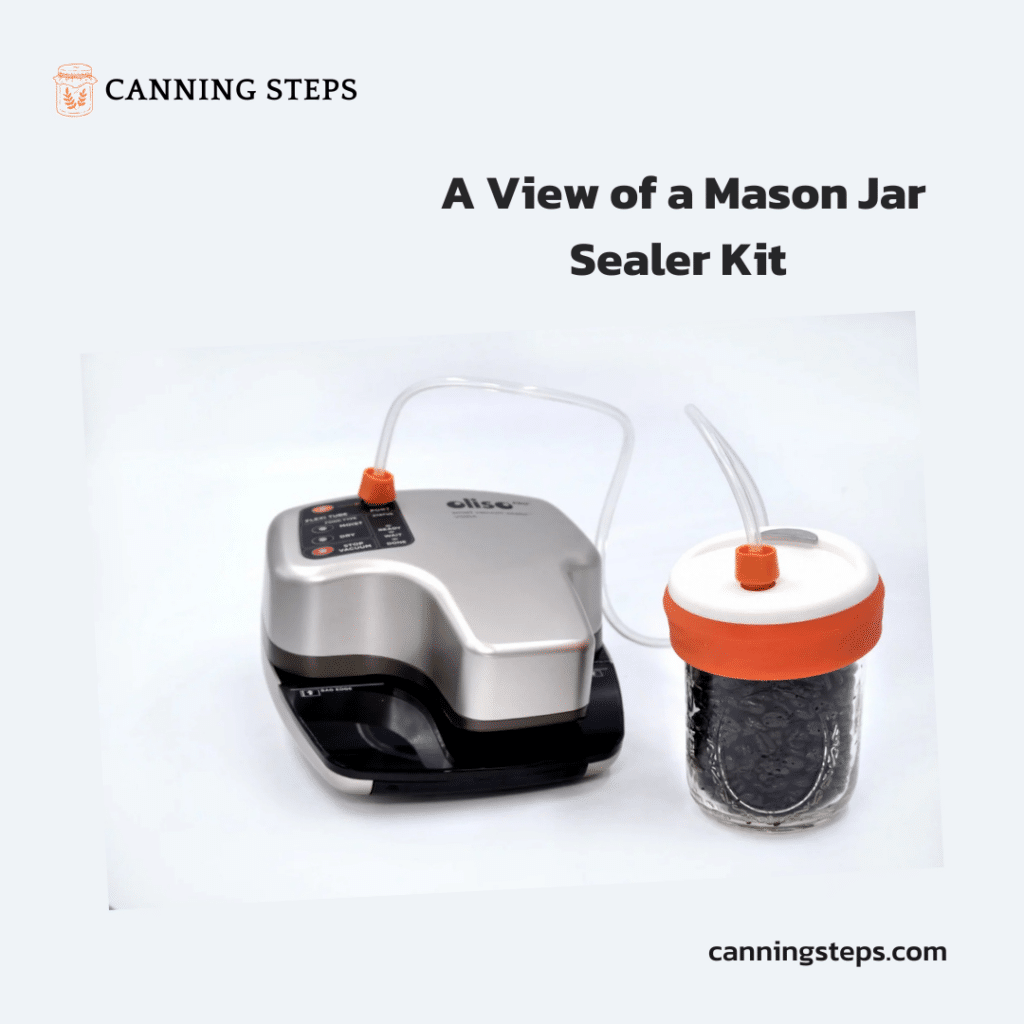
Using a Jar Sealer Kit to Vacuum Seal a Mason Jar
With the correct advice, getting the ideal vacuum seal for your canning jars is simple. Use these easy-to-follow guidelines to preserve your pantry staples effortlessly;
- Prepare the Jar: Put the canning jar’s flat lid on top of it; no ring is needed to keep it in place.
- Select the Correct Attachment: Make sure the canning jar sealer you choose fits the size of your jar, whether it’s a wide-mouth mason jar or a normal mouth. It is useful to have both on hand for versatility.
- Attach the Sealer: Position the vacuum seal jar attachment for canning jars on top of the flat lid and screw it into position so that the sealing process may begin.
- Connect to the Hose Port: Find your FoodSaver unit’s hose or accessory hose. If the hose attachment is missing or needs replacement, ensure it is compatible before ordering a replacement.
- Start the Vacuum Process: Press the “Start” button after attaching the vacuum sealer appliance to the hose attachment port. Observe how the device effectively creates a perfect vacuum seal by drawing out the air from the jar.
- Verify a Tight Seal: After the vacuum process, ensure the canning jar is securely shut. A tight seal will ensure that your goods remain fresh for longer.
- Repeat for Versatility: Consider owning both canning jar sealers if you use both wide-mouth and normal-mouth jars. This makes it easy to transition between different jar sizes for a flexible vacuum-sealing experience.
With these easy-to-follow but effective procedures, you can confidently vacuum seal your canning jars and accurately preserve your kitchen basics.
Dry Canning or Vacuum Canning
It is essential to understand that vacuum sealing and dry canning are two different processes for preserving shelf-stable foods.
- Jar manufacturers consider dry canning, including heating jars with dry food in the oven, dangerous and not recommended.
- The possibility of micro-fractures in the glass due to the dry heat increases the likelihood of jar breaking.
- On the other hand, vacuum sealing appears to be a more secure substitute for keeping commodities such as flour, grains, and canned beans fresh.
- By effectively removing the air, vacuum sealing preserves the contents of the jars in an ideal, oxygen-free state while shielding them from heat.
- Choose the safe route of vacuum canning to extend the shelf life of your pantry staples without sacrificing security.
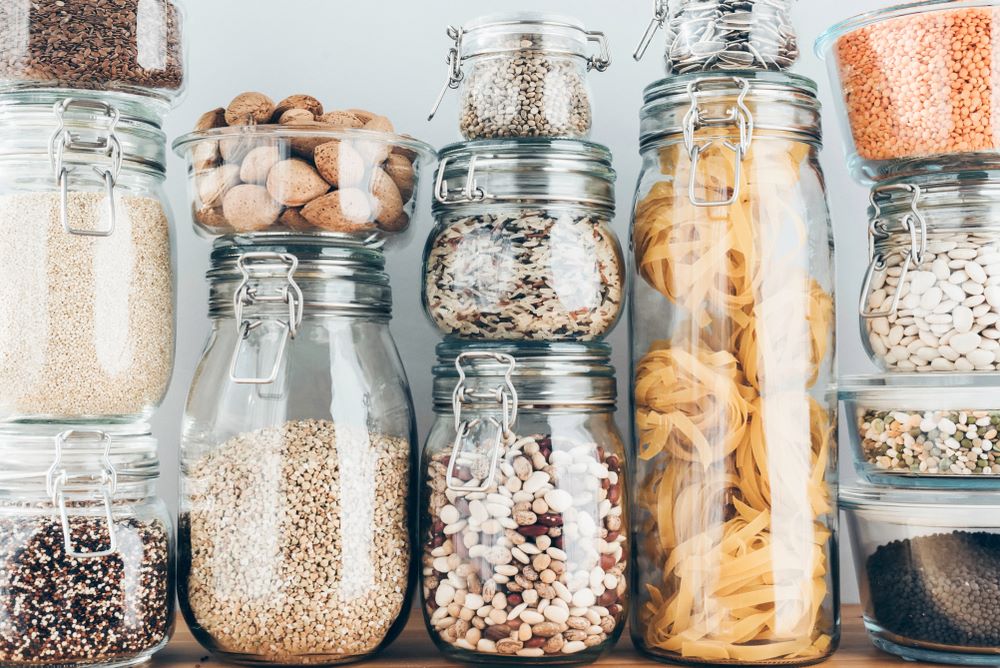
Vacuum Pack Food in Canning Jars
Adopt the skill of vacuum-packing in canning jars to up your pantry game. The endless options are mostly are sorts of dry items.
- Grains
- Wheat
- Pasta
- Dried treats peppers
- Onions
- Mushrooms.
Increase the shelf life of nuts such as pecans, walnuts, and almonds, or effectively store rolled oats, powdered milk, wheat berries, and bulk spices. Save clearance sweets in a vacuum-sealed container for later delight and turn your pantry into a treasure trove. Using this strategy, you keep your essentials fresh and add a little gourmet flair to your shelf organization. Explore the world of vacuum-packed canning jars, where each seal signifies extended quality.
What Not to Vacuum Seal?
Earlier, we have seen what we can easily vacuum seal, now let us see what we can’t vacuum seal efficiently.
- Sugar and Brown Sugar as Sweet Culprits: Refrain from giving in to the urge to vacuum-seal sugar or brown sugar. Using this procedure could lead to an unpleasant surprise: a solid block of sugar that will not come from the jar.
- Cooked or Fresh Foods: Avoid vacuum-sealing cooked or fresh goods that will be stored in the pantry. This procedure is unsafe for anything other than homemade soup or sliced peaches if you don’t intend to refrigerate the jar vacuum for a few days before eating.
- Cookie, Cracker, and Cereal Craving Crunch: Say goodbye to stale cupboard essentials like crackers, cereals, and biscuits, and simply vacuum seal them. This technique helps you avoid the dreaded staleness and preserve freshness, saving you money.
- Perfect Environment: Dark, Cool Storage: Keep your vacuum-sealed jars in a cold, dark place to increase their shelf life. Your preserved goods will remain at their peak for a long time in this perfect environment, ready to enhance your meals anytime you want them to.
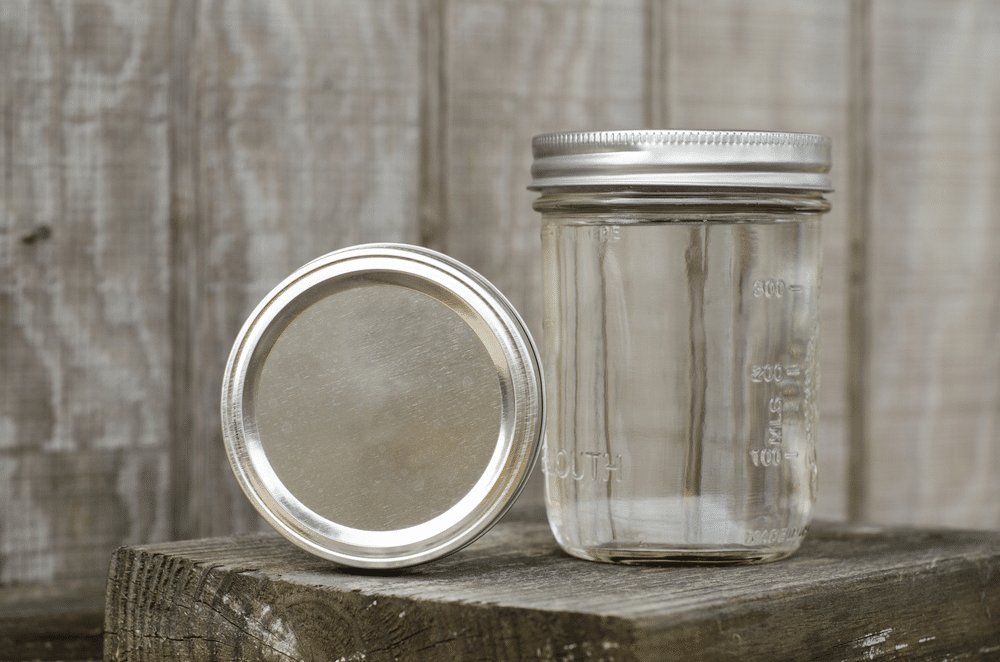
Testing the Vacuum Pack Canning Seal
Now, you must be wondering, once vacuum-packed, can you check for the tightness of the seals? Yes, you certainly can. Preserving items requires more than just vacuum sealing; carefully inspecting the seals before storage is necessary to ensure their longevity. Here’s how to carry out an infallible test;
- Firmness Check: Using your finger, gently press down on the center of the jar lid. A good seal should be firm and possibly recessed, like the action of a strong internal plunger pulling the lid out from the inside.
- Lid Lifting: Remove the band and hoist the jar solely by its lid for a strong indication. A tight seal will prevent the jar from opening, whereas a loose seal could cause an unfavorable explosion. Use caution when performing this test, although a tightly sealed jar should sustain the lift.
- Sonic Assessment: Press the cover and detect any noise. A hollow sound signifies an improper seal, but a high-pitched ping indicates one. This method provides an extra layer of verification for individuals tuned in to auditory cues, even though some may find it less trustworthy.
Once you pass these tests, you can be sure that your vacuum-sealed canning jars are ready to be stored, giving you peace of mind that your pantry essentials are protected from the effects of aging.
How to Break the Vacuum Seal on Your Mason Jar?
It’s easy to break the sturdy vacuum seal on your Mason jar when it’s time to enjoy the rewards of your effort.
- Long fingernails might work, but avoiding putting too much stress on your nails is best.
- Use a butter knife or other thin-edged implement to pry open the lid carefully.
- A bottle opener, sometimes called a “church key,” provides a reliable and secure substitute. Using a tool reduces the possibility of breaking the lid and ensures that your treasures are protected and ready for cooking without difficulty.
- Bid farewell to battling difficult seals and experience the ease of releasing the flavors from your vacuum-sealed Mason jars.
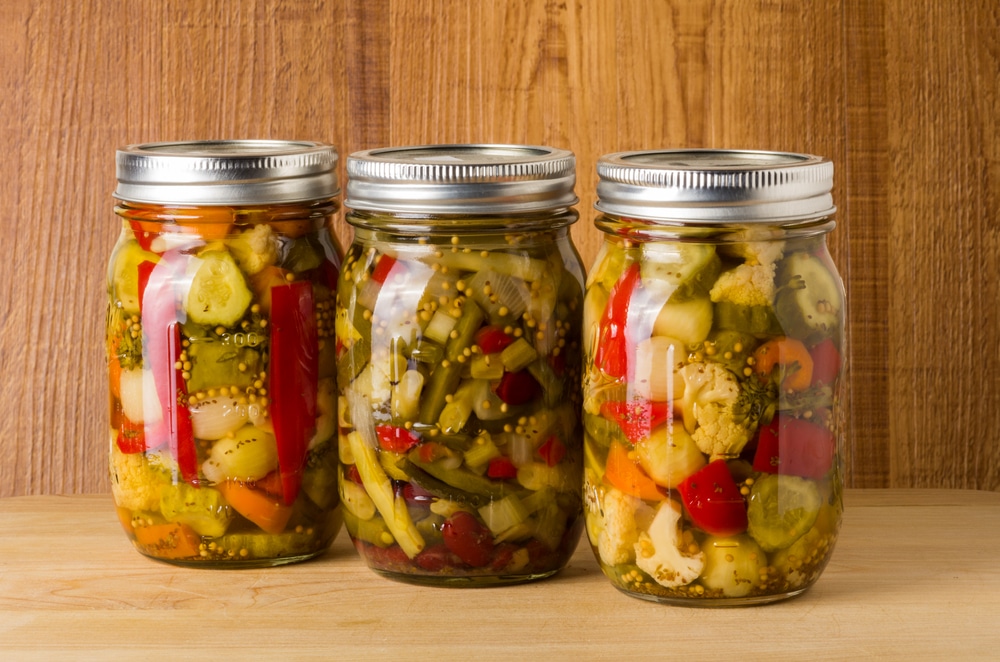
In a Nutshell
Summing up, with the best vacuum-pack canning jar guide, bid farewell to outdated pantry contents and welcome to a world of culinary creativity. This technique becomes a culinary delight, from easily sealing jars with the auxiliary hose to the accuracy of a vacuum-sealed Mason jar. Improve your food preservation skills so that your glass jars become taste protectors and your dry items remain immaculate. You’re not just closing jars when you screw on each flat lid; you’re also sealing your pantry neatly, keeping your food fresh, and opening up new culinary possibilities.
In conclusion, your pantry? Your glass jars turn into culinary heroes, and your food stays fresh. Because of the miracle of vacuum-packing canning jars, it becomes a world of boundless possibilities.
MASTER THE ART OF VACCUM CANNING!


